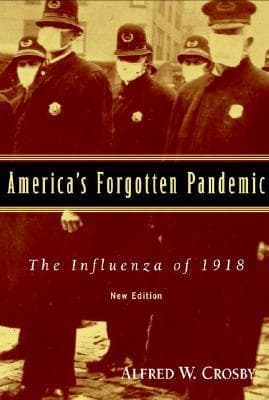
Book Review Summary: America's Forgotten Pandemic: The Influenza of 1918
Introduction
"America's Forgotten Pandemic: The Influenza of 1918" by Alfred W. Crosby is a vivid narrative that recounts the course of the 1918 Spanish influenza pandemic, its impact on American society, and the curious loss of national memory of this cataclysmic event. In a new edition with a preface discussing recent outbreaks of diseases, including the Asian flu and the SARS epidemic, the book remains both prescient and relevant. Crosby, a Professor Emeritus in American Studies, History, and Geography at the University of Texas at Austin, brings his expertise in history, geography, biology, and medicine to shed light on the historical causes behind the disparity in wealth and how epidemics have affected world history.
About Alfred W. Crosby
Alfred W. Crosby Jr. was a renowned scholar who combined the fields of history, geography, biology, and medicine in his interdisciplinary research. He was a Professor Emeritus of History, Geography, and American Studies at the University of Texas at Austin, Harvard University, and the University of Helsinki. Crosby's work explored the biological factors that contributed to the success of Europeans in their quest to conquer the world, investigating how epidemics have shaped human history. He was also interested in the history of science and technology and wrote extensively on topics such as the Columbian Exchange and the history of quantification. Crosby's contributions to academic research and his ability to integrate various disciplines earned him recognition as a respected scholar in his field.
Analysis of Views
- Comprehensive coverage: Readers praise the book for providing a comprehensive review of the 1918 flu pandemic and twentieth-century flu research since. They appreciate the depth of information and the author's ability to delve into various aspects of the pandemic, including its impact on American and European civilians and military personnel, as well as its connection to world events.
- Relevance to contemporary issues: Many readers find parallels between the 1918 pandemic and contemporary pandemics such as COVID-19. They appreciate the insights provided by Crosby's research, which can help inform present-day decisions regarding health policy, pandemic preparedness, and public response.
- Engaging storytelling: Readers enjoy Crosby's storytelling style, which brings the historical events to life. They appreciate his use of anecdotes and personal accounts to illustrate the impact of the pandemic on individuals and communities.
- Historical context: The book provides valuable historical context by discussing the social and political climate during the pandemic. Readers appreciate how Crosby connects the pandemic to broader historical events such as World War I and its aftermath, highlighting how it influenced world events and shaped society.
- Recommendation for further reading: Some readers recommend additional books on pandemics and health policy to complement their understanding of the 1918 flu pandemic. They suggest that reading "Flu" by Gina Kolata or other related books can provide a more comprehensive perspective on this topic.
Reasons for Recommendation
- Comprehensive coverage: Readers recommend this book for its comprehensive coverage of the 1918 flu pandemic and its impact on society. The extensive research and well-rounded analysis make it a valuable resource for anyone interested in understanding this historical event.
- Relevance to contemporary issues: The book's relevance to contemporary pandemics makes it a timely and important read for those seeking insights into health policy, pandemic preparedness, and public response. It provides a historical perspective that can inform present-day decisions and help prevent future pandemics.
- Engaging storytelling: Crosby's engaging storytelling style captivates readers, making it an enjoyable read even for those who may not be familiar with the subject matter. His use of personal accounts and anecdotes brings historical events to life, making it accessible to a wider audience.
- Historical context: The inclusion of historical context adds depth to readers' understanding of the 1918 flu pandemic. By connecting it to broader historical events such as World War I and its aftermath, Crosby provides valuable insights into how pandemics shape society and influence world events.
- Recommendation for further reading: Readers recommend additional books on pandemics and health policy to complement their understanding of the 1918 flu pandemic. They suggest that reading "Flu" by Gina Kolata or other related books can provide a more comprehensive perspective on this topic, making it an even more valuable resource for those interested in exploring this subject further.
Conclusion
"America's Forgotten Pandemic: The Influenza of 1918" by Alfred W. Crosby is a well-researched and engaging narrative that recounts the course of the 1918 Spanish influenza pandemic during World War I. It explores its impact on American society, examines its connection to world events, and delves into the curious loss of national memory surrounding this cataclysmic event. Crosby's interdisciplinary approach brings together history, geography, biology, and medicine to provide a comprehensive review of the pandemic's effects on human history. The book's relevance to contemporary pandemics makes it a valuable resource for those interested in health policy, pandemic preparedness, and public response. Overall, "America's Forgotten Pandemic" is a highly recommended read for those seeking insights into this significant historical event and its implications for present-day society.